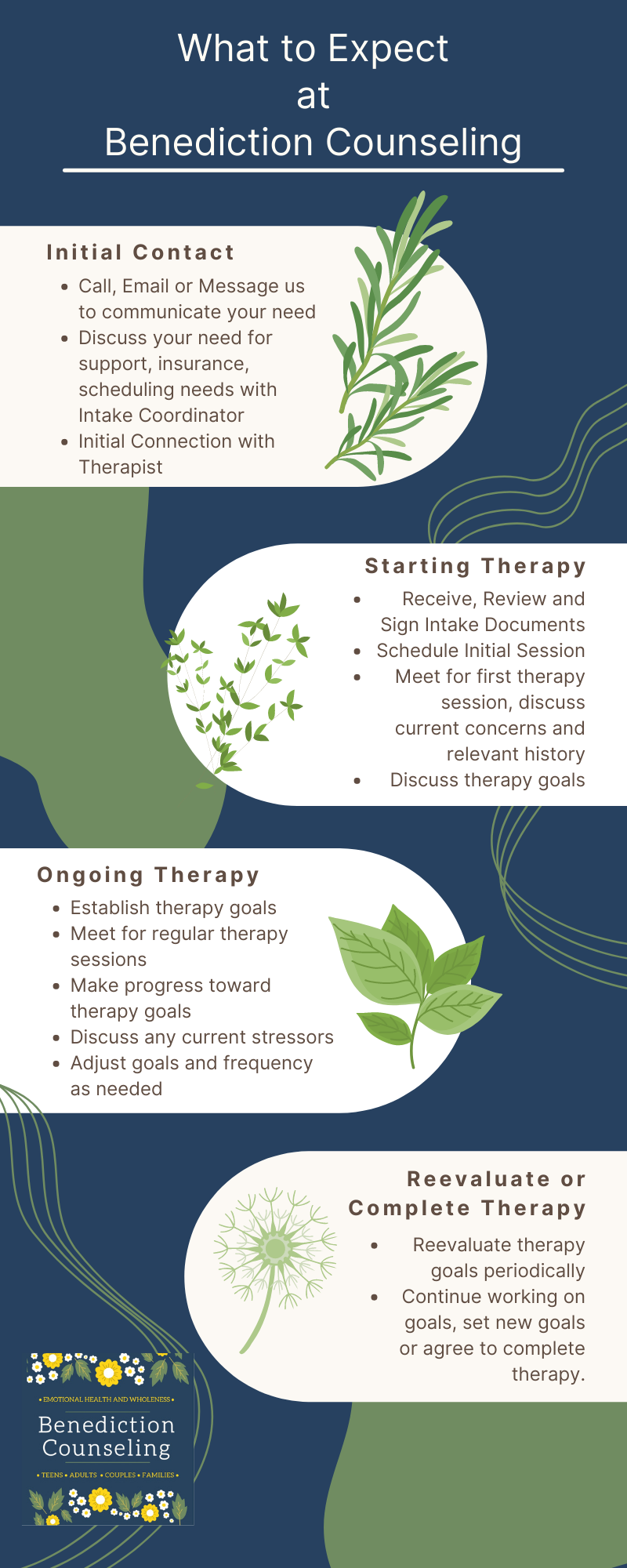What can I expect when I contact Benediction Counseling for the first time?We know it is a strange and sometimes difficult thing to initiate therapy. You may have been thinking about it for some time and are now ready to reach out for support. When you contact us, we'll ask some simple questions about what kind of support you are looking for. At this point, it is helpful for us if you can give us a summary of what is going on for you. This is so we can make sure we have the experience and training necessary to help you. We'll also ask some logistical questions about the days/times you prefer and if you are hoping to utilize your insurance for therapy.
How long are counseling sessions and how often are they scheduled?Most of our clients have 50 minute sessions. The extra 10 minutes in every hour are so that our therapists can take small breaks in between clients and you know, check email, return phone calls, eat a bite, scroll social media for a moment. Sometimes it makes sense to schedule 90 minute sessions. We do this more for couples and families. The frequency of sessions (weekly, every other week, monthly) is tailored to each individual clients' needs. More often than not, we begin with weekly sessions so that we can build up some momentum toward your goals, but really, we can meet as often as you would like. You really do have a choice in the matter!
|
What information do you need from me to start?
In between your first conversation with us and your first session, you will receive an email with a link to our intake documents. Some of these are legally required forms and some of them help us gather information about you so that we can better support you. Please read these forms carefully so that you know more of what to expect! And be thinking about your hopes or goals for therapy--this is really important information for us! To clarify your goals, you can ask yourself, "How will I know that I am done with therapy?"
What is the first session like?
The first session is often a big storytelling time. By that time, we will have a fairly good idea of what you'd like to work on but we don't know the backstory. We may ask you a few questions to get you started, but really, we'd like to know the major things that are affecting you and how those things came to be. You can choose how deep to dive and how much to share (truly!). You and your therapist are developing a new relationship. If you would like to start slow and share more factual information until you feel more comfortable sharing the more vulnerable stuff, we completely support that. If you're ready to rip the bandaid off and get to the hard stuff right away, we can go there with you too. In every therapy conversation, you can choose what feels best. By the end of the first couple of sessions, you and your therapist will be collaboratively setting some goals for your therapy. These go into a treatment plan that we keep in your file to keep the process on track.
How do you therapists know what we need?
Very basically, we listen very carefully to what you share with us. Most of the time, clients are able to tell us what they would like to be different in their life. If that isn't the case, we lean on our own understanding of emotional and relationship health to define the target we're aiming at. We have an eclectic tool box of philosophies, skills, theories and healing stories we can reach for as we discover more about what each client needs to heal. There are some things that all people can use more of: compassion, emotional safety, understanding, a listening ear, non-judgemental/unconditional support, etc. And there are specific tools that we have training and experience utilizing for different conditions. You are always welcome to ask your therapist about their strategy for helping your unique circumstances.
How long can I expect to be in therapy?
This is a very understandable question--you want to know what kind of commitment this will be! It is also the hardest question for us to answer. Our most honest answer is, it depends! It depends on how severely you are affected and how long it has been lasting. It depends on how much emotional energy you have to put into the process. It depends on your schedule (and ours!) and how frequently we're able to meet. It depends on such a unique combination of qualities that it is hard to predict how quickly someone will progress toward their goals. If you have a certain amount of time you'd like to be in therapy, we can work to tailor our approach to those time goals. Ideally, this is a collaborative conversation between you and your therapist! What we do know is that if you initiate therapy before you're at a breaking point, your time in therapy will be less!
